By Suzanne Leigh
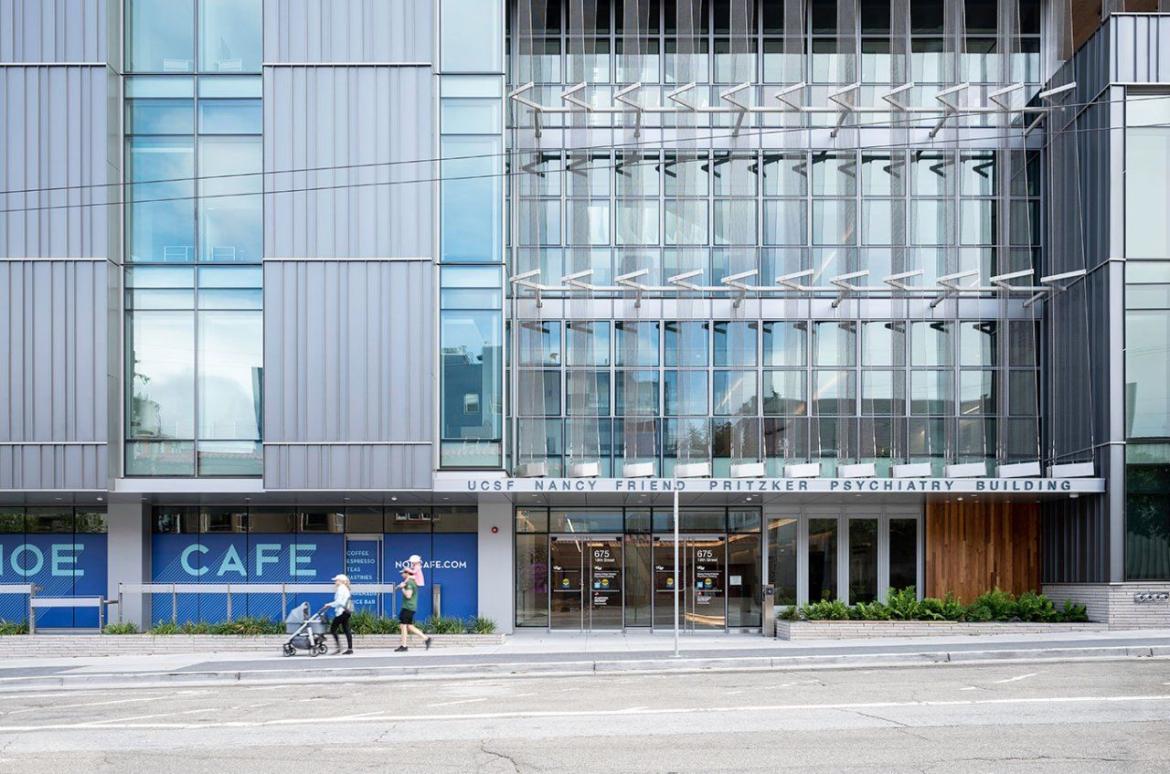
The UCSF Nancy Friend Pritzker Psychiatry Building is the culmination of a long-standing vision to bring together physical and mental health at UCSF and eliminate the boundaries that have isolated psychiatry from other disciplines that advance brain health and treat brain disorders.
UC San Francisco is welcoming its first patients to the Nancy Friend Pritzker Psychiatry Building, a one-of-a-kind treatment center that aims to redefine mental health services and make a bold statement against stigma.
The five-story,150,000-square-foot building represents a visible departure from older psychiatry facilities, many of them located in secluded places with obscured facades. Situated adjacent to UCSF’s Mission Bay campus, the new building’s central location and proximity to transportation hubs, together with its light-filled atrium and interior transparency signal openness to the community outside, as well as within the building itself.
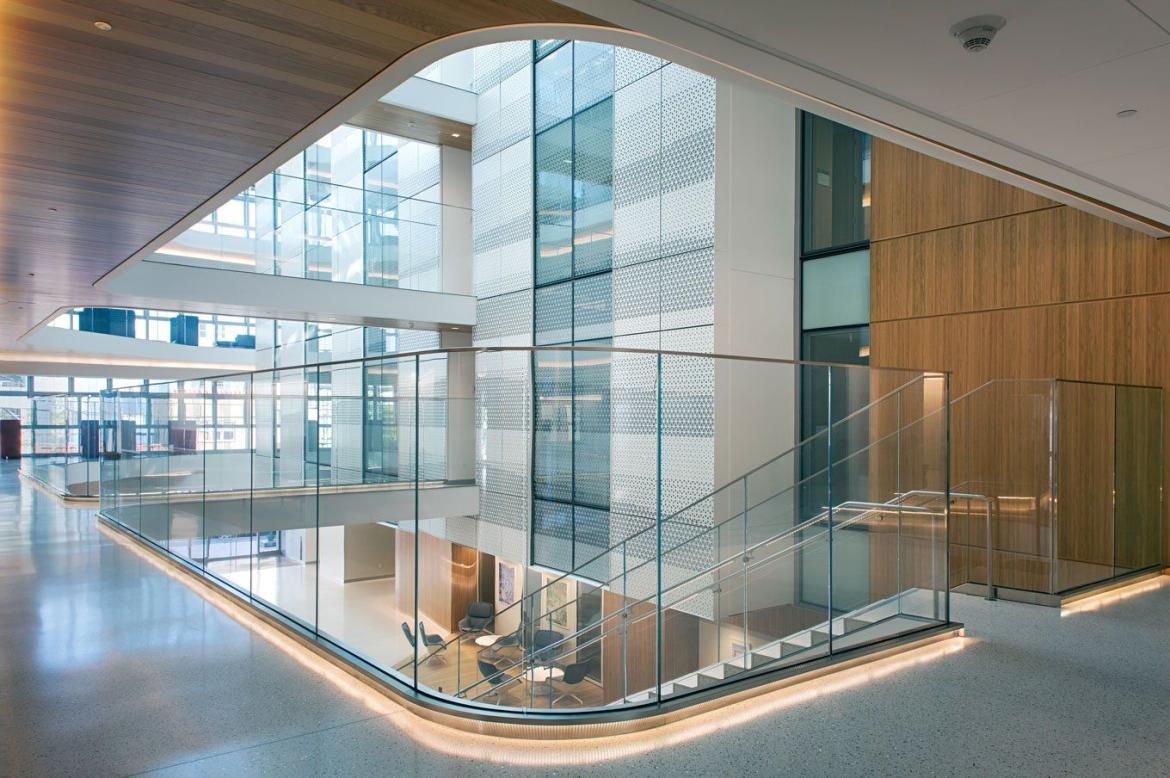
The UCSF Nancy Friend Pritzker Psychiatry Building's light-filled atrium is the first step in transforming mental health care for Bay Area patients and families. [Photo: Andrea Rowe]
The building is the culmination of a long-standing vision to bring together physical and mental health at UCSF and eliminate the boundaries that have isolated psychiatry from other disciplines that advance brain health and treat brain disorders.
“We wanted to design a building that defied outdated psychiatric institutional models that separated mental from physical health and perpetuated a culture of shame,” said Matthew W. State, MD, PhD, chair and Oberndorf Family Distinguished Professor of Psychiatry and Behavioral Sciences at UCSF. “We created a place with welcoming entrances and engaging gathering spaces that will draw in patients and families. It will give them access to light and nature, integrate physical and mental health services, and allow them to focus on healing in a low-stress environment.”
The building is one of the few in the nation that combines outpatient mental health care for people of all ages with top-ranking programs in psychiatry and psychology training. It includes a center for pediatric, adolescent, and family health care, and promotes collaborative research across psychiatry, psychology, neurology, neurosurgery, radiology, pediatrics, anesthesiology, and obstetrics/gynecology – all under one roof.
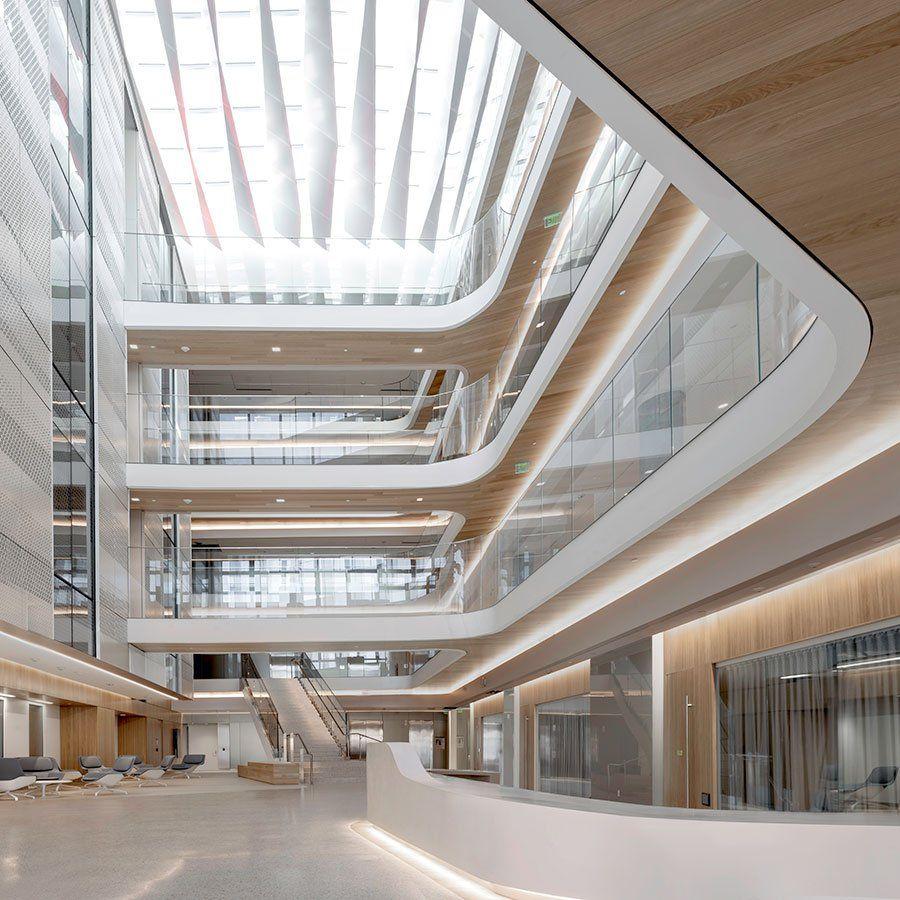
An airy and light-filled lobby welcomes patients and visitors to the UCSF Nancy Friend Pritzker Psychiatry Building. [Photo: Susan Merrell]
A space designed around healing, light, and beauty
The building, located at 675 18th St., was made possible by a gift of nearly $60 million from philanthropists John Pritzker and Lisa Pritzker, longtime supporters of UCSF. It is named in honor of John’s sister Nancy Friend Pritzker, who died by suicide at age 24 during a depressive episode in 1972.
“The new building challenges the stigma of mental health by creating an aesthetic space that conveys calm, inclusion and caring,” said John Pritzker. “Our hope is that with better therapies resulting from cross-disciplinary collaboration, tailored to each patient, we will end the silent suffering of patients with mental illnesses.”
Designed by ZGF Architects with input from more than 100 UCSF faculty and staff, the buiding includes the UCSF Child, Teen and Family Center, with its own child-friendly entrance, a rooftop garden accessible to patients and staff, museum-quality art by celebrated photographer Richard Misrach alongside a community-based youth art program, a therapeutic kitchen for families of patients with eating disorders, and a gym to evaluate children with neurodevelopmental disorders.
The building also will have two ultrasound machines that deliver noninvasive ultrasonic beams to targets deep within the brain, which may alleviate depression in patients who have not responded to medication. There is a sleep clinic, a neuroimaging suite with cutting-edge technology, and dedicated space to evaluate new therapies for some of the most intractable psychiatric disorders. It also includes an auditorium and conference center for world experts to convene and advance the field.
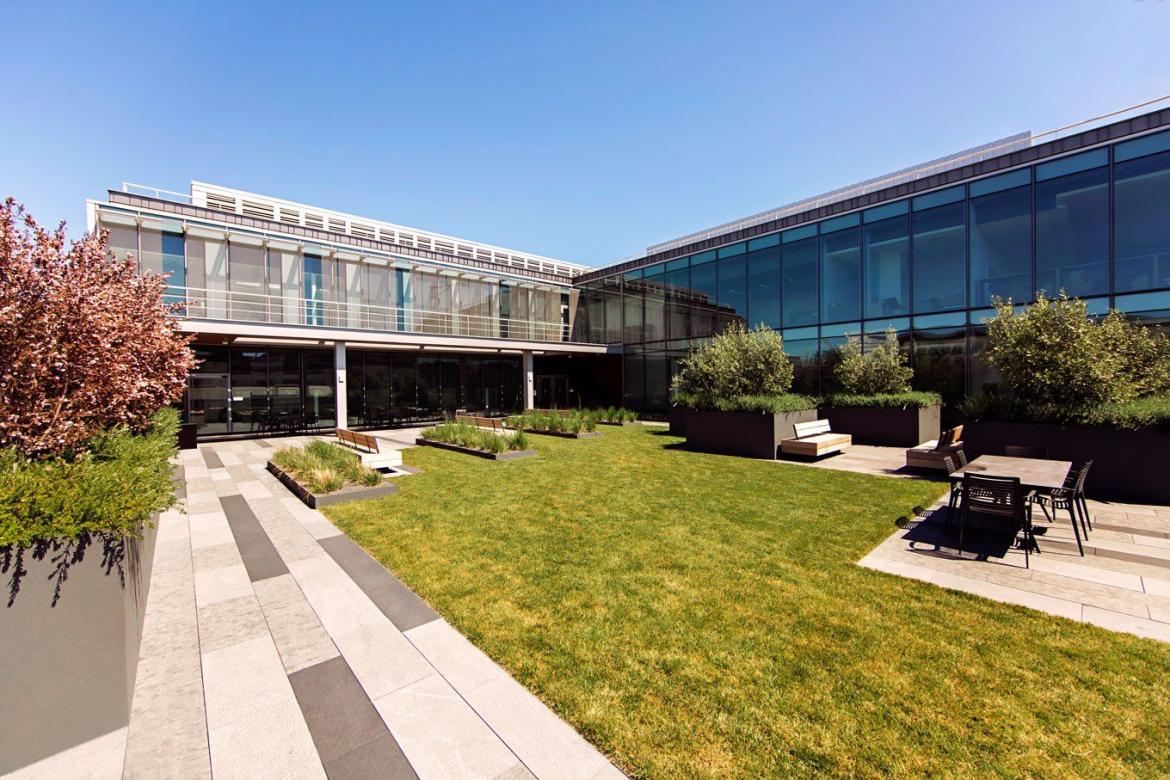
A rooftop garden creates a peaceful oasis for patients, families, and staff. [Photo: Andrea Rowe]
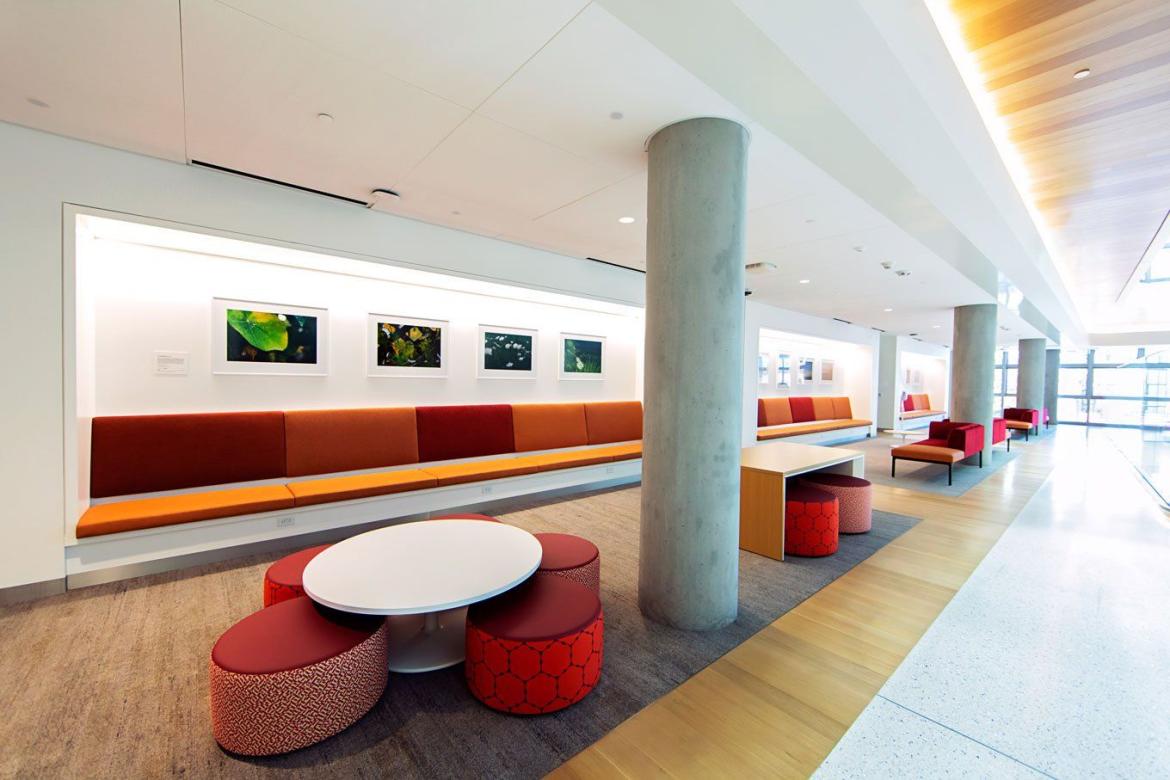
Bold artwork and bright designs transform the UCSF Child, Teen, and Family Center. [Photo: Andrea Rowe]
Unprecedented mental health crisis following pandemic
The timing of the opening of the new building coincides with “an unprecedented mental health crisis” due to the COVID pandemic, said Lisa Pritzker, whose commitment to mental health was shaped by depression in her own family, as well as her volunteer experience at Zuckerberg San Francisco’s General Hospital’s psychiatric floor in 2003 to 2004.
“There need not be any stigma or shame in seeking mental health care. It is critical that people of all ages and background have access to the best psychiatric care,” she said. “The Child, Teen and Family Center at the new Nancy Friend Pritzker Psychiatry Building will be just this sort of place, providing a compassionate environment for excellent care.”
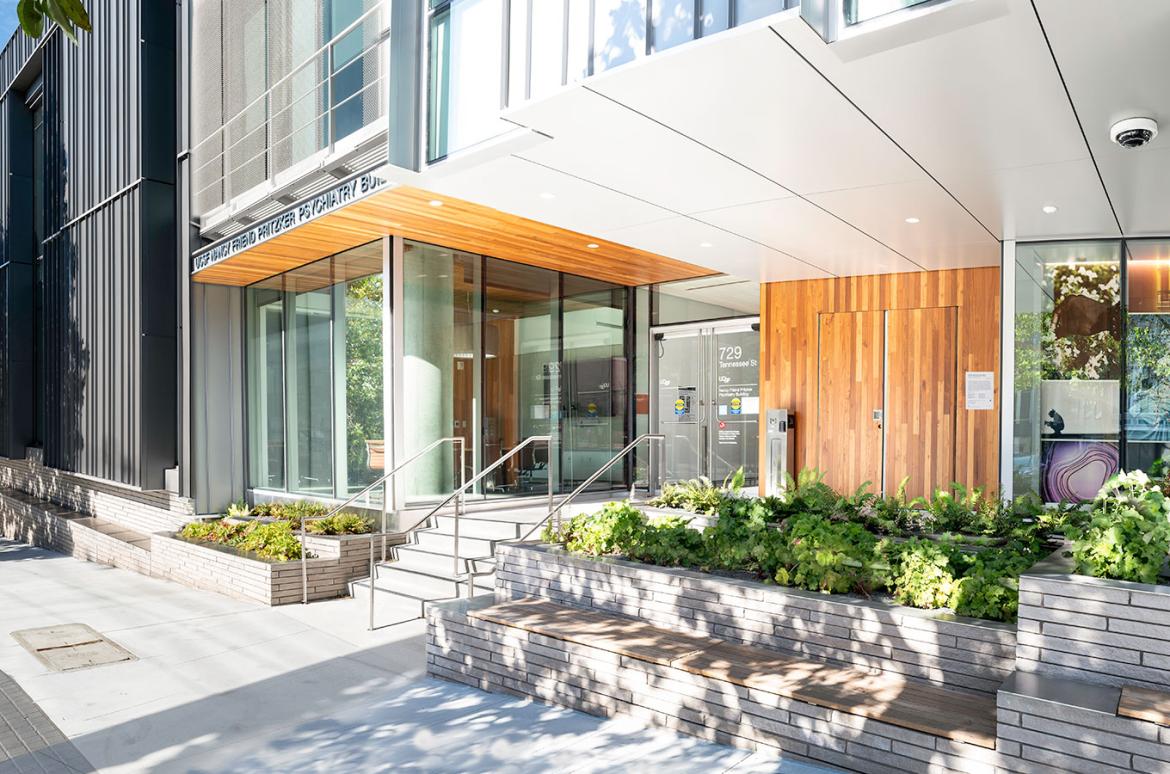
The building offers a separate, welcoming entrance to the UCSF Child, Teen and Family Center. [Photo: Susan Merrell]
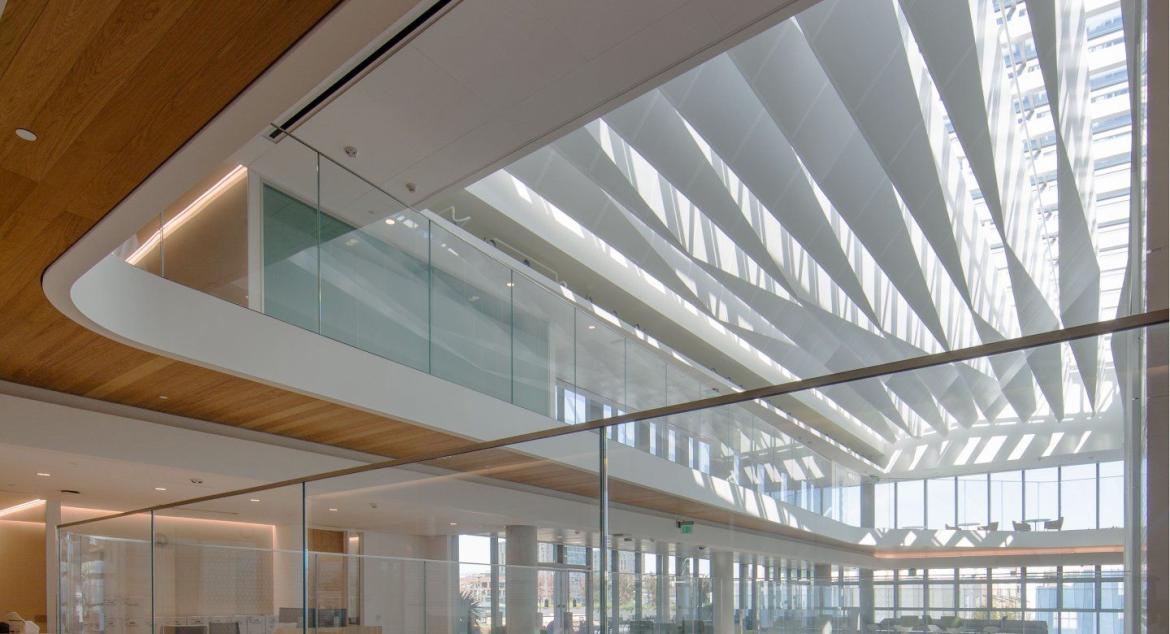
The UCSF Nancy Friend Pritzker Psychiatry Building's light-filled space has been designed to serve as an antidote to silent suffering and to reinforce compassion and healing.
State, who also serves on the steering committee for the UCSF Weill Institute for Neurosciences, said that the building speaks to the vision of John Pritzker and Lisa Pritzker in supporting a specialty that does not receive the financial investments seen in other medical fields.
“This is a brave and generous gesture from John and Lisa, and a fitting tribute to Nancy Friend Pritzker, a vibrant and brilliant young woman who experienced severe mental illness,” he said. “Nancy’s legacy will live on with our patients seeking treatment here, as well as with the clinicians, researchers, and educators working to better our understanding and treatment of mental health issues.”
The new building is a public-private partnership between UCSF and the developer/owner SKS/Prado, a joint venture of SKS Partners and the Prado Group with construction led by general contractors Hathaway Dinwiddie Construction Co.
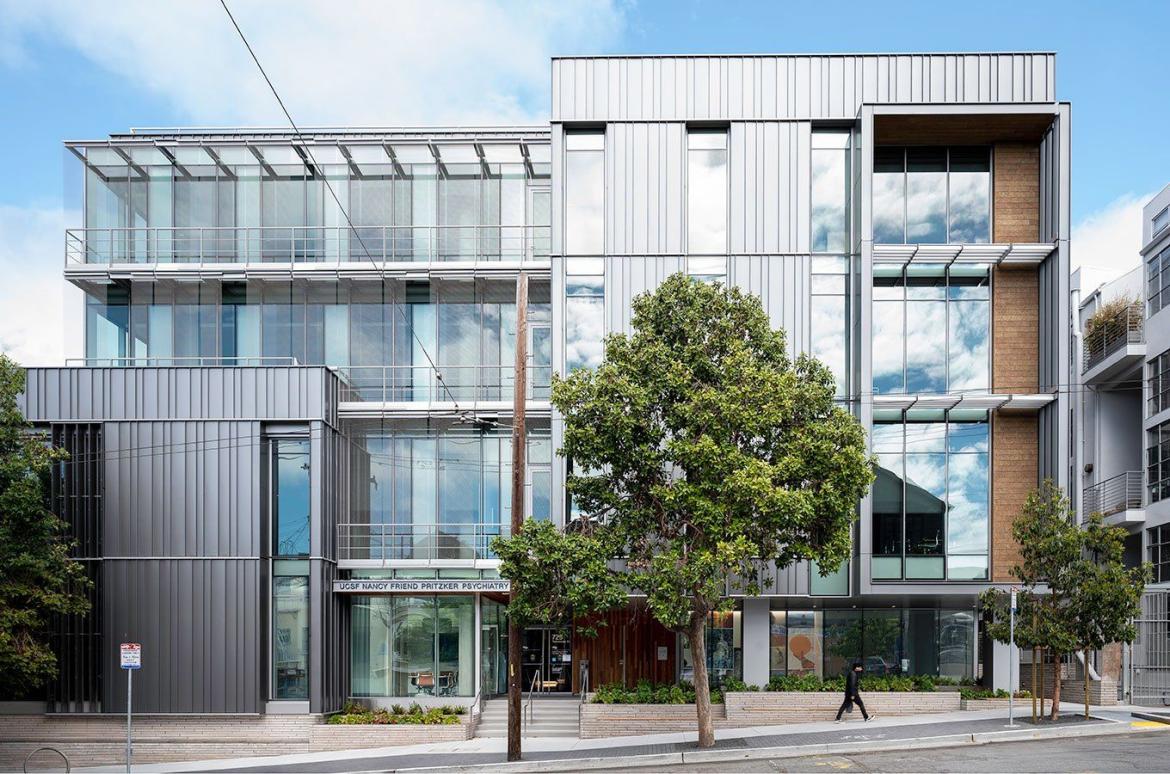
The building was made possible by a gift of nearly $60 million from philanthropists John Pritzker and Lisa Pritzker, longtime supporters of UCSF.
Further coverage
- San Francisco Chronicle: UCSF opens new psychiatry building aiming to "redefine mental health services"
- San Francisco Business Times: 'Nancy would be thrilled': UCSF's newly opened psychiatry center marks mental health journey
- KRON 4: UC San Francisco opens psychiatric center, without the stigma
About UCSF Psychiatry and Behavioral Sciences
The UCSF Department of Psychiatry and Behavioral Sciences and the Langley Porter Psychiatric Institute are among the nation's foremost resources in the fields of child, adolescent, adult, and geriatric mental health. Together they constitute one of the largest departments in the UCSF School of Medicine and the UCSF Weill Institute for Neurosciences, with a mission focused on research (basic, translational, clinical), teaching, patient care, and public service.
UCSF Psychiatry and Behavioral Sciences conducts its clinical, educational, and research efforts at a variety of locations in Northern California, including the UCSF Nancy Friend Pritzker Psychiatry Building; UCSF Langley Porter Psychiatric Hospital; UCSF Medical Centers at Parnassus Heights, Mission Bay, and Mount Zion; UCSF Benioff Children’s Hospitals in San Francisco and Oakland; Zuckerberg San Francisco General Hospital and Trauma Center; the San Francisco VA Health Care System; UCSF Fresno; and numerous community-based sites around the San Francisco Bay Area.
About the UCSF Weill Institute for Neurosciences
The UCSF Weill Institute for Neurosciences, established by the extraordinary generosity of Joan and Sanford I. "Sandy" Weill, brings together world-class researchers with top-ranked physicians to solve some of the most complex challenges in the human brain.
The UCSF Weill Institute leverages UCSF’s unrivaled bench-to-bedside excellence in the neurosciences. It unites three UCSF departments—Psychiatry and Behavioral Sciences, Neurology, and Neurological Surgery—that are highly esteemed for both patient care and research, as well as the Neuroscience Graduate Program, a cross-disciplinary alliance of nearly 100 UCSF faculty members from 15 basic-science departments, as well as the UCSF Institute for Neurodegenerative Diseases, a multidisciplinary research center focused on finding effective treatments for Alzheimer’s disease, frontotemporal dementia, Parkinson’s disease, and other neurodegenerative disorders.
About UCSF
The University of California, San Francisco (UCSF) is exclusively focused on the health sciences and is dedicated to promoting health worldwide through advanced biomedical research, graduate-level education in the life sciences and health professions, and excellence in patient care. UCSF Health, which serves as UCSF’s primary academic medical center, includes top-ranked specialty hospitals and other clinical programs, and has affiliations throughout the Bay Area.





